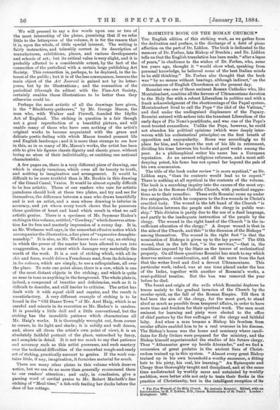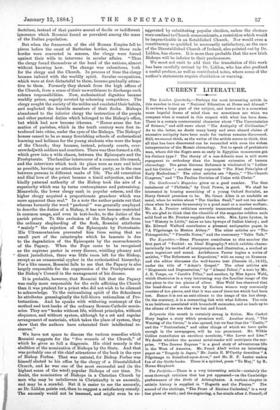ROSMINI'S BOOK ON THE ROMAN CHURCH.*
Tax English edition of this striking work, as we gather from the dedication and preface, is the discharge of a debt of pions
affection on the part of Dr. Liddon. The book is dedicated to the memory of Dr. Forbes, late Bishop of Brechin ; and Dr. Liddon tells us that the English translation has been made, " after a lapse of years," in obedience to the wishes of Dr. Forbes, who, some ten years ago, thought it " would show what, speaking from personal knowledge, he believed some of the best Italian minds to be still thinking." Dr. Forbes also thought that the book was "by no means without bearings, although indirect," on the circumstances of-English Churchmen at the present day.
Rosmini was one of those eminent Roman Catholics who, like Montalembert, combine all the fervour of Ultramontane devotion to the Holy See with a robust Liberalism in politics and with a frank acknowledgment of the shortcomings of the Papal system.
Montalembert lived to call the Pope " the idol of the Vatican," and died under the undisguised displeasure of the Papacy. Rosmini entered with ardour into the transient Liberalism of the early days of Pio Nono's pontificate, and was one of the Pope's most trusted counsellors. Unlike the Pope, however, he could not abandon his political opinions (which were deeply inter- woven with his ecclesiastical principles) on the first breath of opposition and unpopularity. Rome was accordingly no fit place for him, and he spent the rest of his life in retirement, dividing his time between his books and good works among the poor. As a philosophical writer his name has a European reputation. As an earnest religions reformer, and a most self- denying priest, his fame has not spread far beyond the pale of his own communion.
The title of the book under review " is more mystical," as Dr. Liddon says, "than its contents would lead us to expect."
There is nothing at all mystical in the contents of the volume.
The book is a searching inquiry into the causes of the most cry- ing evils in the Roman Catholic Church, with practical sugges- tions as to their remedies. These evils Rosmini sums up under five categories, which he compares to the five wounds in Christ's crucified body. The wound in the left hand of the Church " is the division between the people and the clergy in public wor- ship." This division is partly due to the use of a dead language, and partly to the inadequate instruction of the people by the clergy. The wound in the right hand of the Church " is the in- sufficient education of the clergy." A deeper wound is that in the side of the Church, and this "is the disunion of the Bishops " among themselves. The wound in the right foot "is that the nomination of Bishops is given up to the lay power." The fifth wound, that in the left foot, "is the servitus,"—that is, the conditions imposed by the State on the tenure of ecclesiastical property. On all these questions Rosmini has much to say which deserves serious consideration, and all the more from the fact that the writer lived and died a devout Ultramontane. This particular work, indeed, was at one time placed under the ban of the index, together with another of Rosmini's works, a semi-political treatise. But the ban was removed the year before he died.
The fount and origin of the evils which Rosmini deplores he traces mainly to the gradual invasion of the Church by the secular spirit, on the fall of the Roman Empire. Till then it
had been the aim of the clergy, for the most part, to stand aloof as much as possible-from temporal affairs, in order to have
more time and freedom for their spiritual work. The men most eminent for learning and piety were elected to the office of chief pastors by the free suffrages of the clergy and faithful laity. And when a man became a Bishop his freedom from secular affairs enabled him to be a real overseer in his diocese. The Bishop's house was the home and seminary where candi-
dates for Holy Orders were prepared for the ministry, and the Bishop himself superintended the studies of his future clergy. Thus " Athanasius grew up beside Alexander," and we find a succession of great prelates in the ancient Sees of Christ- endom trained up in this system. " Almost every great Bishop trained up in his own household a worthy successor, a fitting heir to his piety, his zeal, his learning." An Episcopate and Clergy thus thoroughly taught and disciplined, and at the same time nndistracted by worldly cares and untainted by worldly ambition, were better able not only to train their flocks in the practice of Christianity, but in the intelligent reception of its • The Five Wounds of the Holy Church. By Antonio Rosmini. Edited, with an Introduction, by H. P. Liddon, D.D., Canon Residentiary of St. Paul's. London : Rivingtons. 1883.
doctrines, instead of that passive assent of docile or indifferent ignorance which Rosmini found so prevalent among the mass of the Italian population.
But when the framework of the old Roman Empire fell to pieces before the onset of Barbarian hordes, and those rode hordes were converted in masses, the clergy were forced against their wills to intervene in secular affairs. " Thus the clergy found themselves at the head of the nations, almost without knowing how. The change was calamitous, both for the clergy and the Church. In process of time the clergy became imbued with the worldly spirit. Secular occupations, which were at first distasteful to them, became gradually attrac- tive to them. Formerly they shrank from the high offices of the Church, from a sense of their unworthiness to discharge such solemn responsibilities. Now, ecclesiastical dignities became worldly prizes, eagerly coveted by scheming competitors. The clergy sought the society of the nobles and emulated their habits, and neglected the humble members of their flocks. Bishops abandoned to the inferior clergy the instruction of the people and other pastoral duties which belonged to the Bishop's office, but which had now become irksome. "Hence arose the for- mation of parishes, which in the tenth century were first in- troduced into cities, under the eyes of the Bishops. The Bishops' houses ceased to be so many flourishing schools of ecclesiastical learning and holiness for the young students who were the hope of the Church; they became, instead, princely courts, over- crowdedjwith soldiers and courtiers. There was thus formed a rift, which grew into a wide chasm, between the Episcopate and the Presbyterate. The familiar intercourse of a common life ceased, and the interviews which took its place were as rare and brief as possible, having no attraction for either party, as is the case between persons in different ranks of life. The old veneration and filial love of the priest became a timid subjection, and the kindly paternal authority of the Bishop took the airs of a superiority which was by tarns contemptuous and patronising. Meanwhile, the lower clergy sank in popular esteem, and the higher clergy acquired a proportionate grandeur which was more apparent than real." In a note the author points out that whereas formerly the word " pastoral " was generally employed to describe the ditties of a Bishop, it has now become restricted in common usage, and even in text-books, to the duties of the parish priest. To this exclusion of the Bishop's office from the ordinary shepherding of the flock, Rosmini attributes " mainly " the rejection of the Episcopate by Protestants. His Ultramontanism prevented him from seeing that no small part of the catastrophe which he laments is due to the degradation of the Episcopate by the encroachments of the Papacy. When the Pope came to be recognised as the supreme pastor in every diocese, wielding plenary and • direct jurisdiction, there was little room left for the Bishop, except as an ornamental cypher in the ecclesiastical hierarchy. For a like reason, Rosmini fails to see that the Papacy is also largely responsible for the suppression of the Presbyterate as the Bishop's Council in the management of his diocese.
It is probable, however, that Rosmini felt that the Papacy was really more responsible for the evils afflicting the Church than it was prudent for a priest who did not wish to be silenced to acknowledge. To'the rationalising spirit of the Schoolmen he attributes genealogically the full-blown rationalism of Pro- testantism. And he speaks with withering contempt of the method and text-books of the ordinary Roman-Catholic semin- aries. They are " books without life, without principles, without eloquence, and without system, although by a set and regular arrangement of materials, which takes the place of system, they show that the authors have exhausted their intellectual re- sources."
We have not space to discuss the various remedies which Rosmini suggests for the " five wounds of the Church," of which he gives so fall a diagnosis. His chief remedy is the . abolition of the nomination of Bishops by the State. And that was probably one of We chief attractions of the book in the eyes of Bishop Forbes. That was natural, for Bishop Forbes was himself elected to his office by the clergy of a Disestablished Church, and he was one of the most successful and (in the highest sense of the word) popular Bishops of our time. No doubt, the nomination of Bishops in a Christian Church by men who may be unbelievers in Christianity is an anomaly, and may be a scandaL But it is easier to see the anomaly, as Dr. Liddon points out, than to suggest a satisfactory remedy. The anomaly would not be lessened, and might even be ex- aggerated by substituting popular election, unless the electors, were confined to Church communicants, a restriction which would be impracticable in an Established Church. Nor would even a constituency so qualified be necessarily satisfactory, as the case of the Disestablished Church of Ireland, also pointed out by Dr- Liddon, has shown. It is more than probable that the new Irish Bishops will be inferior to their predecessors.
We mast not omit to add that the translation of this work has been carefully revised by Dr. Liddon, who has also prefixed a useful preface, as well as contributed notes, where some of the author's statements require elucidation or warning.







































 Previous page
Previous page